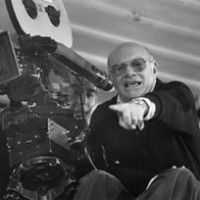Italian screenwriter and director famous for his films from the 1960’ and 1970’s in which he portrayed the relationship between man and the society and the power as well as sending strong social and political messages. In his youth he studied law. He started his career as an illustrator of books for children and also worked for the Naples radio. In 1946, he assisted Ettore Giannini on his theatre production and afterwards Luchino Visconti on his films
The Earth Trembles (La terra trema, 1948) and
Senso (1953). In 1951, he began his screenwriting career as one of the screenwriters for Visconti’s film
Bellissima (1952). He was assistant director to Lucian Emmer, Michelangelo Antonioni and Mario Monicelli. He directed several last scenes of the film
Anita Garibaldi (Camicie rosse, 1952) when director Goffredo Alessandrini left the production. Together with Vittorio Gassman he directed the biopic
Kean: Genius or Scoundrel (Kean - Genio e sregolatezza, 1957), starring Gassman as the lead. He made his autonomous directing debut with
La sfida (1957), which was awarded in Venice. Next he directed
The Magliari (I magliari, 1959) that tells the story about an Italian emigrant in Germany and touches upon the problem of mafia. During 1960’s and the 1970’s he was one of the key authors of the political post-neorealist film who focused on the problem of corruption in the post-war Italy and other controversial topics. In 1962, he won the Silver Bear as best director in Berlin for his crime drama
Salvatore Giuliano (1962) about the Sicilian gangster. His next film,
Hands Over the City (Le mani sulla città, 1963), starring Rod Steiger, was even more successful and won the Golden Lion in Venice in 1963. His first film in color was
The Moment of Truth (Il momento della verità, 1965) about a farmer who wants to become a bull fighter. Afterwards, he directed the romantic drama
C'era una volta (1967) starring Sophia Loren and Omar Sharif. Based on the memoires by Emilio Lussu, anti-fascist activist who later became an Italian senator, he directed the anti-war film
Men Against... (Uomini contro, 1970) in Italian-Yugoslav co-production. His next three films had controversial topics, from the mysterious death of Enrico Mattei, president of the Italian national oil and gas company Eni in
The Mattei Affair (Il caso Mattei, 1971), across political intrigues around the famous gangster in
Lucky Luciano (1973) to corruption of government institutions in
Illustrious Corpses (Cadaveri eccellenti, 1976). During the preparations for the film
The Mattei Affair he contacted the Sicilian journalist Mauro De Mauro who was supposed to help him in the investigation of Mattei’s death, but De Mauro soon disappeared under suspicious circumstances. Rosi won the Golden Palm in Cannes in 1972 for that film (together with
La classe operaia va in paradiso, 1971, by Elio Petri).
Illustrious Corpses brought him the award David di Donatello for best film (together with
Amici miei, 1975, by Mario Monicelli) and director as well as the Italian Golden Globe for best film in 1976. He concluded the 1970’s with another successful film, war drama
Christ Stopped at Eboli (Cristo si è fermato a Eboli, 1979) and worked again with the actor Gian Maria Volonté. The film won several awards at international festivals, including the British BAFTA award as best foreign film in 1983. Afterwards he directed the awarded drama
Three Brothers (Tre fratelli, 1980), which was selected to be the Italian candidate for an Oscar in the category Best Foreign Film in 1982. He worked with Plácido Domingo on the film adaptation of Bizet’s opera
Carmen (1984). Based on the novel by Gabriela García Márquez he directed the drama
Chronicle of a Death Foretold (Cronaca di una morte annunciata, 1987) starring Rupert Everett, Ornella Muti and Gian Maria Volonté. He directed part of the omnibus by twelve Italia directors
12 registi per 12 città (1989) and afterwards the thriller starring James Belushi, Mimi Rogers, Vittorio Gassman and Philippe Noiret
Dimenticare Palermo (1990). He directed the documentary film
Neapolitan Diary (Diario napoletano, 1992) and then his last feature film, war drama
The Truce (La tregua, 1997) starring John Turturro and Rade Šerbedžija that won the David di Donatello award for best film and director. Between 2003 and 2008, he directed several theatre plays by Eduardo De Fillipo. He received the honorary Golden Bear for life-time achievement at the Berlin Film Festival in 2008 and the Golden Lion for life-time achievement at the Venice Film Festival in 2012.
Filmography
The Truce (La tregua, 1997)
Neapolitan Diary (Diario napoletano, 1992) (documentary)
Dimenticare Palermo (1990)
12 registi per 12 città (1989) (dio Napoli)
Chronicle of a Death Foretold (Cronaca di una morte annunciata, 1987)
Carmen (1984)
Three Brothers (Tre fratelli, 1981)
Christ Stopped at Eboli (Cristo si è fermato a Eboli, 1979)
Illustrious Corpses (Cadaveri eccellenti, 1976)
Lucky Luciano (1973)
The Mattei Affair (Il caso Mattei, 1972)
Men Against... (Uomini contro, 1970)
More Than a Miracle (C'era una volta, 1967)
The Moment of Truth (Il momento della verità, 1965)
Hands Over the City (Le mani sulla città, 1963)
Salvatore Giuliano (1962)
The Magliari (I magliari, 1959)
La sfida (1958)
Kean: Genius or Scoundrel (Kean - Genio e sregolatezza, 1957) (co-director)
Anita Garibaldi (Camicie rosse, 1952) (final scenes)
